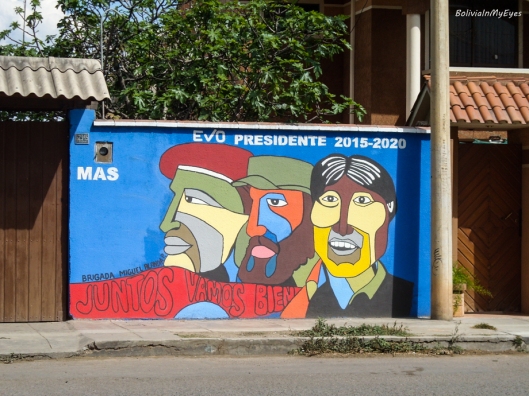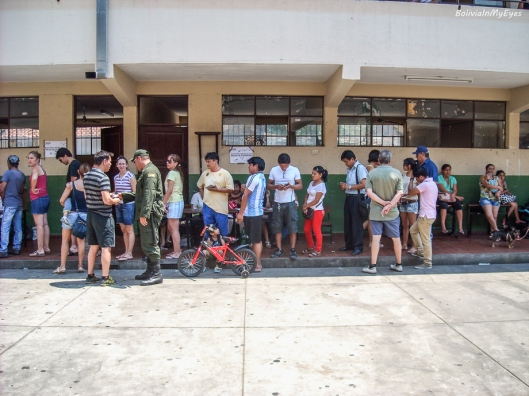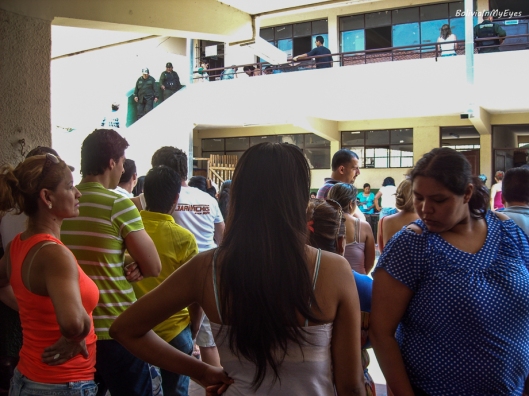Zostalam dzis obudzona przez ptaki, ktore rozpoczely swoje spiewy=wrzaski o 4 nad ranem. Nie byloby w tym nic dziwnego, gdyby nie fakt, iz zdarzylo sie to po raz pierwszy od kiedy mieszkamy w centrum ponad milionowego miasta. Moze nie byly to zwykle ptaki? Moze byly to ptaki wyborcze?
Dzis bowiem mamy w Boliwii wybory prezydenckie.
Podobno wyniki wyborow byly znane jeszcze przed ich rozpoczeciem. Obecny prezydent, Evo Morales Ayma, prowadzi bowiem w ostatnich sondazach z ponad 40 procentowa przewaga nad swoim najwiekszym przeciwnikiem – Samuelem Doria Medina. Jezeli Morales wygra, bedzie to jego trzecia kadencja – pierwsze wybody wygral bowiem w 2005 roku, z ponad 60% poparciem.
Skad taka przewaga? 62 % spoleczenstwa Boliwii stanowia rdzenii Indianie (Aymara, Quechua i Guarani), dla ktorych wybor pierwszego indianskiego prezydenta stanowil zapowiedz lepszej przyszlosci. I tak sie stalo – w 2009, Evo Morales zlikwidowal Republike i powolal do zycia – Wielonarodowe Panstwo Boliwii (Estado Pluronacional de Bolivia), z nowa konstytucja (dlatego tez mogl po raz trzeci legalnie startowac w wyborach). Prezydent otworzyl ‘swoim ludziom’ okno do lepszej przyszlosci, obsadzajac najwazniejsze i pomniejsze stanowiska panstwowe urzednikami pochodzenia indianskiego. Obronil on koke – swieta rosline Inkow, przeciwstawiajac sie najwiekszemu mocarstwu na swiecie – Stanom Zjednoczonym, czym zjednal do siebie caly swiat andyjski. Podniosl on tradycyjne obrzedy, jak Nowy Rok Aymara, do rangi panstwowej, a na oficjalnych spotkaniach pojawial sie w tradycyjnym poncho i swetrze z alpaki. To ostatnie nie ma juz miejsca – prezydent przeszedl bowiem stylowa przemiane, ale wciaz jest on straznikiem tradycji i rdzennej kultury Boliwii.
Boliwia w ostatnim roku zanotowala najwiekszy wzrost gospodarczy w regionie, w tym samym czasie wysylajac swoja pierwsza satelite w kosmos – i to wszystko przemawia na korzysc Evo Moralesa.
Jednak nie trudno jest zauwazyc i zgodzic sie z opozycja, iz te wszystkie zmiany sa powierzchowne, bowiem w ostatnim czasie rowniez zmniejszylo sie poczucie bezpieczenstwa, zwiekszyl handel narkotykami a skrajne ubostwo od dawna utrzymuje sie na poziomie około 20 procentow. Panstwo wciaz zmaga sie z wysokim bezrobociem, brakiem szans dla mlodych ludzi. Odcielo sie rowniez od demokratycznego swiata, zawierajac sojusz polityczny z Wenezuela, Kuba i Iranem.
Dla mnie ta nowa Boliwia jest jak panstwowa szkola podstawowa w Cochabambie, ktora odwiedzilam niemal dwa lata temu: pieknie odmalowana z zewnatrz, lecz zaniedbana i biedna od wewnatrz. Tak samo zreszta wygladaja niema wszystkie instytucje panstwowe – od urzedow po szpitale.
Przez 10 lat swojego urzedowania, prezydent nie zlikwidowal roznic spolecznych, a tylko je zatuszowal. Co prawda, jak przeczytalam niedawno, jeszcze kilka lat temu ludzie pochodzenia indianskiego nie pojawiali sie na placu glownym w Santa Cruz, z obawy przed wyzwiskami ze strony bogatszych, bialych Boliwijczykow. Dzis, centrum miasta jest otwarte dla wszystkich, ale wciaz rzadko sie widuje osoby o ciemniejszym kolorze skory w okolicznych kafejkach i restauracjach w roli innej niz barmani, kelnerzy czy sprzataczki. Wciaz bowiem zwykly obywatel nie moze sobie pozwolic na luksus wypicia kawy za 25 bs. czy zjedzenia posilku za 50 bs.
Poza tym, rasism wciaz sie tli w Boliwijczykach – ja sama bylam swiadkem jego przejawow, jednoczesnie uswiadomiajac sobie, ze dzieki temu, iz prezydent jest Indianinem, ta dyskryminowana czesc spoleczenstwa moze sie bronic. Moze byc dumna ze swojego pochodzenia. I to wlasnie uwazam za najwieksze dokonanie prezydentury Evo Moralesa. Przy wszystkich jej niedociagnieciach.
Dzis spoleczenstwo Boliwii wybiera nowego przywodce, choc jak widac z sondazy przedwyborczych, decyzja zostala juz podjeta dawno temu.
Mysle, ze ludzie nie boja sie zmian, ktore przynioslby wybor nowego prezydenta, ale powrotu starego porzadku, ktory odebralby im glos, odzyskany przeciez tak niedawno.
Tylko czy ‘Evo cumple’ swoje starsze i nowsze obietnice?
P.S. Wybory przebiegaja spokojnie. Ruch na ulicach zostal ograniczony, komunikacja miejska zostala zawieszona. Zakaz na sprzedaz i publiczne spozycie alkoholu dziala od piatku. W lokalach wyborczych tlumy i kolejki. Troche tez balaganu, ale kazdy uprawniony do glosowania musi odczekac swoje, bo inaczej czekalaby go kara pieniezna i inne utrudnienia. Wybory w Boliwii sa bowiem obowiazkowe.
***
I was waken up today by birds, which started their singing = screams at 4am. There would be nothing surprising in this, if not for the fact that it happened for the first time since I’ve moved to the city of over one million habitants. Maybe there weren’t normal birds? Maybe they were elections birds?
In fact, today we have a presidential elections in Bolivia.
Apparently the results were known long ago, even before the voting has started. The current president, Evo Morales Ayma, leads in recent surveys with more than 40 percent advantage over his biggest opponent – Samuel Doria Medina. If Morales wins, it will be his third term, as he won his first elections in 2005, with support of over 60% of population.
How did he got such an advantage? 62% of Bolivian society are indegenous people of Aymara, Guarani and Quechua, for whom the election of the first Indian president ment a chance of a better future. And so it happened – in 2009, Evo Morales liquidated the Republic and brought to life Plurinational State of Bolivia (Estado Pluronacional de Bolivia), with the new constitution (that’s why he could legaly start in elections again). President has opened to ‘his people’ a window to a better future, giving the most important and minor positions in the state administration to the officials of Indian origin. He defend the coca – holy plant of Incas, opposing the greatest power in the world – the United States and becaming the leading figure in the Andean world. He raised the traditional rites, such as Aymara New Year, to rank of a state holiday, reappearing at official meetings in a traditional poncho and alpaca sweater. The latter has since changed – the president undergone a stylish makeover, but still remaining the guardian of traditions of Bolivias’ indigenous cultures.
Last year Bolivia recorded the highest economic growth in the region, at the same time launching its first satellite in space – it all speaks for the benefit of Evo Morales.
However, it’s not difficult to see and agree with the opposition that all these changes superficial. In recent years Bolivians lost their sense of security, drug trafficking increased and extreme poverty remaines on the same level of 20%. The state still struggles with high unemployment, lack of opportunities for young people, in the same time distancing itself from the democratic world by political alliance with Venezuela, Cuba and Iran.
For me, this new Bolivia is like the public primary school in Cochabamba, which I visited almost two years ago: newly painted on the outside, but neglected and poor on the inside. This also applies to all state institutions – from offices to hospitals.
For 10 years, the president hasn’t managed to eliminate social differences but only covered them up. I read recently, that a few years back people of Indian origin couldn’t freely pass their time on the main square in Santa Cruz, as they were constantly insulted by the wealthier and white Bolivians. Today, the city center is open to all, but rarely people with darker skin color can be seen in the surrounding cafes and restaurants in a role other than bartenders, waiters or cleaners. The ordinary citizens still cannot afford the luxury of buying a coffee for 25 bs. or a meal for 50 bs.
Besides, rasism still smolders in Bolivians – I was myself a witness to racist behaviour, realizing in the same time that discriminated and the most vulnarable people have a chance to defend themselves, thanks to no one else than their Indian president. At last they can be proud of their roots. And I consider this as the biggest success of the Evo Morales’ presidency.
Today Bolivian people will decide who will run their country, although as can be seen in the pre-election surveys, the decision has already been taken.
I think that people are not afraid of change, which could be brought by the new president, but they fear the return of the old order, that could deprive them of the voice, they regained not so long time ago.
The question is, will Evo cumple his older and newer promises?
P. S. Election is conducted peacefully. Traffic on the streets is limited as public transport was ceased. The ban on the sale and public consumption of alcohol is in effect from Friday. In polling stations crowds and queues. It’s a bit messy, but everyone entitled to vote must wait for his turn, otherwise hefty fines and other difficulties would await. The elections in Bolivia are mandatory.




